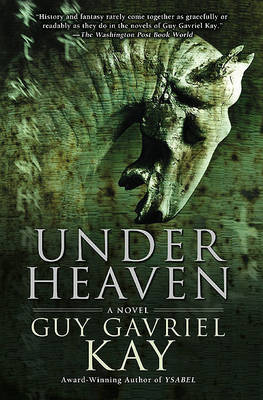Reviewed by empressbrooke on
To be truthful, after the wait for Under Heaven, the result was a little anti-climatic. As I was reading it, I kept thinking that it was The Sarantine Mosaic Lite. In both books, a commoner gets embroiled in the politics of an emperor's court during a tumultuous time in the empire's history. In both books, the main character exists almost only for the purpose of letting the reader view through his eyes all of the women who are influencing events in a male-dominated society. The Sarantine Mosaic just does it with a little more sharpness, and with richer characters. Under Heaven excelled when it came to weaving Kay's themes through the story, but the themes sort of overwhelmed the characters and pushed them to the background.
I think this was the first Kay book where I didn't feel a fierce connection to multiple characters. They just lacked a richness and seemed more like 2D figures that existed to move the story forward. Had I never read a Kay book before, I probably wouldn't have even noticed, but creating fully realized characters is something he normally excels at above and beyond what most other authors are capable of. There were quite a few people that I wanted to know more about, but Kay just didn't dig quite deep enough for that.
The themes, however, really came alive. Kay's obviously still looking at many of the same ones from [b:Ysabel|104078|Ysabel|Guy Gavriel Kay|http://photo.goodreads.com/books/1171506604s/104078.jpg|100357] relating to history and our places in it. There were many passages noting the differences between the history recorded by poets and the history recorded by scholars, and how their different focuses and distance from the events can affect what we know about what transpired in the past.
One theme that rolled over from Ysabel was the idea that every story has many many threads running through it, and each person that touches one story will have a full story of their own. Kay notes towards the end of Under Heaven, "Tales have many strands, smaller, larger. An incidental figure in one story is living through the drama and passion of his or her own life and death." He illustrated this throughout Under Heaven by switching to the POV of various minor characters for a few pages, only to never speak through them again. It hammered home the idea that there are all these lives going on outside the main story.
Like Ysabel, Under Heaven says a lot of smart things about history, things that I'm not quite smart enough to articulate. My only complaint was that the epilogue sort of made these themes a little TOO explicit. I'm at least smart enough to pick up on all of this as I was reading, and I didn't need the equivalent of the ending of Pan's Labyrinth, which laid out the moral of the story that had been communicated quite well in a subtle fashion up until that point.
Kay's writing, as usual, was just wonderful. Kay's writing has become so familiar to me by now that when I came across the line, "He didn't dismiss her. He remembered, instead, how she'd fought at sunrise, in a garden in Chenyao," I thought to myself, "That is SO Kay!"
At the moment, I'm thinking I'm more likely to re-read [b:The Last Light of the Sun|104080|The Last Light of the Sun|Guy Gavriel Kay|http://photo.goodreads.com/books/1171506604s/104080.jpg|416279], my least favorite Kay book, before this one, but we'll see how this one sit in my head after time has gone by.
Reading updates
- Started reading
- 14 June, 2010: Finished reading
- 14 June, 2010: Reviewed
